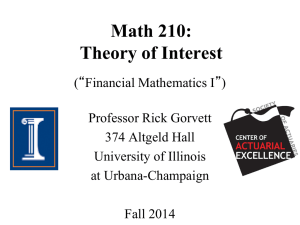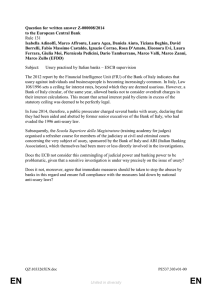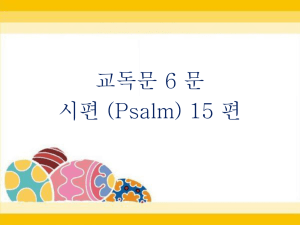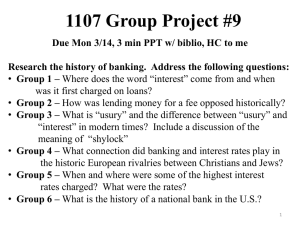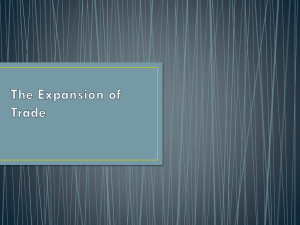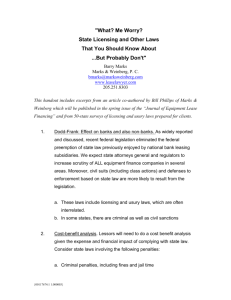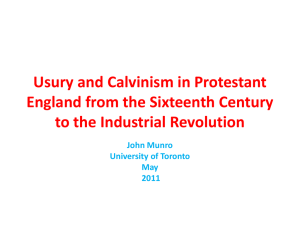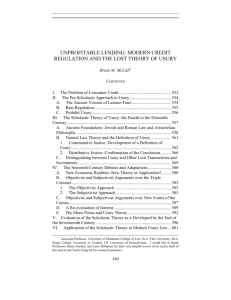usury in early modern england and shakespeare
advertisement
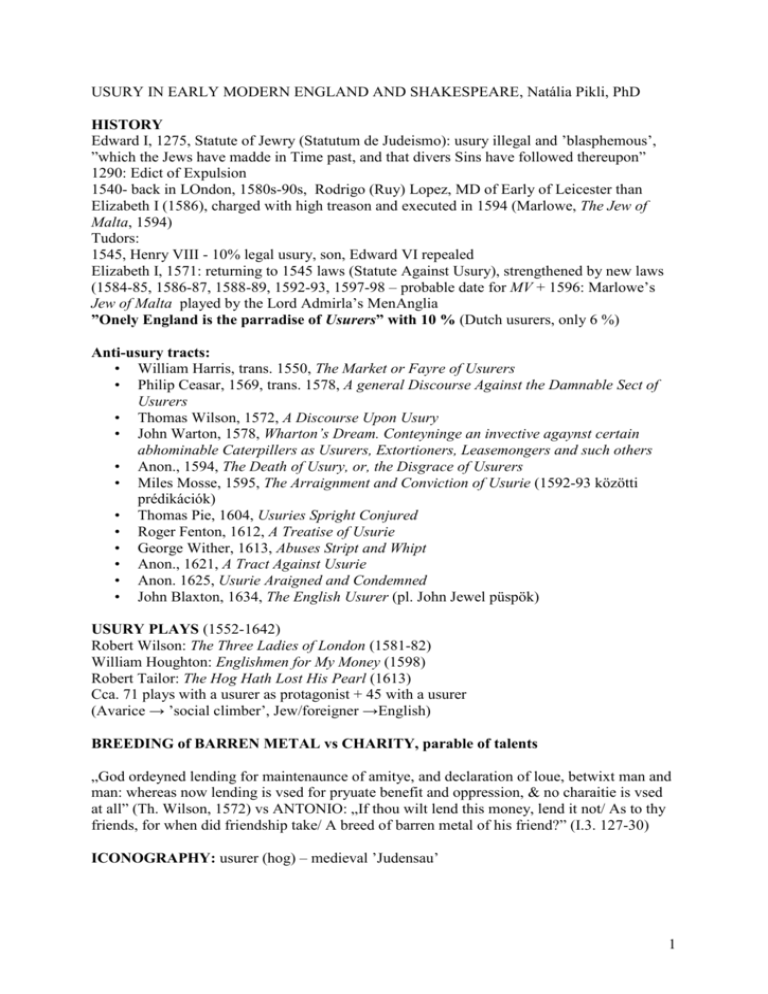
USURY IN EARLY MODERN ENGLAND AND SHAKESPEARE, Natália Pikli, PhD HISTORY Edward I, 1275, Statute of Jewry (Statutum de Judeismo): usury illegal and ’blasphemous’, ”which the Jews have madde in Time past, and that divers Sins have followed thereupon” 1290: Edict of Expulsion 1540- back in LOndon, 1580s-90s, Rodrigo (Ruy) Lopez, MD of Early of Leicester than Elizabeth I (1586), charged with high treason and executed in 1594 (Marlowe, The Jew of Malta, 1594) Tudors: 1545, Henry VIII - 10% legal usury, son, Edward VI repealed Elizabeth I, 1571: returning to 1545 laws (Statute Against Usury), strengthened by new laws (1584-85, 1586-87, 1588-89, 1592-93, 1597-98 – probable date for MV + 1596: Marlowe’s Jew of Malta played by the Lord Admirla’s MenAnglia ”Onely England is the parradise of Usurers” with 10 % (Dutch usurers, only 6 %) Anti-usury tracts: • William Harris, trans. 1550, The Market or Fayre of Usurers • Philip Ceasar, 1569, trans. 1578, A general Discourse Against the Damnable Sect of Usurers • Thomas Wilson, 1572, A Discourse Upon Usury • John Warton, 1578, Wharton’s Dream. Conteyninge an invective agaynst certain abhominable Caterpillers as Usurers, Extortioners, Leasemongers and such others • Anon., 1594, The Death of Usury, or, the Disgrace of Usurers • Miles Mosse, 1595, The Arraignment and Conviction of Usurie (1592-93 közötti prédikációk) • Thomas Pie, 1604, Usuries Spright Conjured • Roger Fenton, 1612, A Treatise of Usurie • George Wither, 1613, Abuses Stript and Whipt • Anon., 1621, A Tract Against Usurie • Anon. 1625, Usurie Araigned and Condemned • John Blaxton, 1634, The English Usurer (pl. John Jewel püspök) USURY PLAYS (1552-1642) Robert Wilson: The Three Ladies of London (1581-82) William Houghton: Englishmen for My Money (1598) Robert Tailor: The Hog Hath Lost His Pearl (1613) Cca. 71 plays with a usurer as protagonist + 45 with a usurer (Avarice → ’social climber’, Jew/foreigner →English) BREEDING of BARREN METAL vs CHARITY, parable of talents „God ordeyned lending for maintenaunce of amitye, and declaration of loue, betwixt man and man: whereas now lending is vsed for pryuate benefit and oppression, & no charaitie is vsed at all” (Th. Wilson, 1572) vs ANTONIO: „If thou wilt lend this money, lend it not/ As to thy friends, for when did friendship take/ A breed of barren metal of his friend?” (I.3. 127-30) ICONOGRAPHY: usurer (hog) – medieval ’Judensau’ 1 o Blaxton - Usurer: „I say I will have all both use and principal”, Hog1: „Mine is the usurers desire, To roote in earth, wallow in mire”, Hog2: „Living spare me, and Dead share me” FRANCIS BACON Essayes: Religious Meditations. Places of Perswasion and Disswasion. Seene and Allowed (1597), 2nd ed 1612 (38 essays), 3rd ed Essayes or Counsels, Civill and Morall (1625, 58 essays) Of Sedition and Troubles (1625) „Above all things, good policy is to be used, that the treasure and moneys, in a state, be not gathered into few hands. For otherwise a state may have a great stock, and yet starve. And money is like muck, not good except it be spread. This is done, chiefly by suppressing, or at least keeping a strait hand, upon the devouring trades of usury, ingrossing great pasturages, and the like.” Ballad of Gernutus „His life was like a Barrow Hogge, that liveth many a day Yet never once doth any good, Untill men will him slay. Or like a filthy heap of dung, That lyeth in a hoord; Which never can doe any good, Till it be spread abroad.” Of Usury (1625) Many have made witty invectives against usury. They say that it is a pity, the devil should have God's part, which is the tithe. […]That usurers should have orange-tawny bonnets, because they do judaize. That it is against nature for money to beget money; and the like. I say this only, that usury is a concessum propter duritiem cordis; for since there must be borrowing and lending, and men are so hard of heart, as they will not lend freely, usury must be permitted. Some others, have made suspicious and cunning propositions of banks, discovery of men's estates, and other inventions. But few have spoken of usury usefully. It is good to set before us, the incommodities and commodities of usury, that the good, may be either weighed out or called out; and warily to provide, that while we make forth to that which is better, we meet not with that which is worse. The discommodities of usury are, First, that it makes fewer merchants. For were it not for this lazy trade of usury, money would not he still, but would in great part be employed upon merchandizing; which is the vena porta of wealth in a state. The second, that it makes poor merchants. For, as a farmer cannot husband his ground so well, if he sit at a great rent; so the merchant cannot drive his trade so well, if he sit at great usury. The third is incident to the other two; and that is the decay of customs of kings or states, which ebb or flow, with merchandizing. The fourth, that it bringeth the treasure of a realm, or state, into a few hands. For the usurer being at certainties, and others at uncertainties, at the end of the game, most of the money will be in the box; and ever a state flourisheth, when wealth is more equally spread. The fifth, that it beats down the price of land; for the employment of money, is chiefly either merchandizing or purchasing; and usury waylays both. The sixth, that it doth dull and damp all industries, improvements, and new inventions, wherein money would be stirring, if it 2 were not for this slug. The last, that it is the canker and ruin of many men's estates; which, in process of time, breeds a public poverty. On the other side, the commodities of usury are, first, that howsoever usury in some respect hindereth merchandizing, yet in some other it advanceth it; for it is certain that the greatest part of trade is driven by young merchants, upon borrowing at interest; so as if the usurer either call in, or keep back, his money, there will ensue, presently, a great stand of trade. The second is, that were it not for this easy borrowing upon interest, men's necessities would draw upon them a most sudden undoing; in that they would be forced to sell their means (be it lands or goods) far under foot; and so, whereas usury doth but gnaw upon them, bad markets would swallow them quite up. As for mortgaging or pawning, it will little mend the matter: for either men will not take pawns without use; or if they do, they will look precisely for the forfeiture. I remember a cruel moneyed man in the country, that would say, The devil take this usury, it keeps us from forfeitures, of mortgages and bonds. The third and last is, that it is a vanity to conceive, that there would be ordinary borrowing without profit; and it is impossible to conceive, the number of inconveniences that will ensue, if borrowing be cramped. Therefore to speak of the abolishing of usury is idle. All states have ever had it, in one kind or rate, or other. So as that opinion must be sent to Utopia. To speak now of the reformation, and reiglement, of usury; how the discommodities of it may be best avoided, and the commodities retained. It appears, by the balance of commodities and discommodities of usury, two things are to be reconciled. The one, that the tooth of usury be grinded, that it bite not too much; the other, that there be left open a means, to invite moneyed men to lend to the merchants, for the continuing and quickening of trade. This cannot be done, except you introduce two several sorts of usury, a less and a greater. For if you reduce usury to one low rate, it will ease the common borrower, but the merchant will be to seek for money. And it is to be noted, that the trade of merchandize, being the most lucrative, may bear usury at a good rate; other contracts not so. To serve both intentions, the way would be briefly thus. That there be two rates of usury: the one free, and general for all; the other under license only, to certain persons, and in certain places of merchandizing. First, therefore, let usury in general, be reduced to five in the hundred; and let that rate be proclaimed, to be free and current; and let the state shut itself out, to take any penalty for the same. This will preserve borrowing, from any general stop or dryness. This will ease infinite borrowers in the country. This will, in good part, raise the price of land, because land purchased at sixteen years' purchase will yield six in the hundred, and somewhat more; whereas this rate of interest, yields but five. This by like reason will encourage, and edge, industrious and profitable improvements; because many will rather venture in that kind, than take five in the hundred, especially having been used to greater profit. Secondly, let there be certain persons licensed, to lend to known merchants, upon usury at a higher rate; and let it be with the cautions following. Let the rate be, even with the merchant himself, somewhat more easy than that he used formerly to pay; for by that means, all borrowers, shall have some ease by this reformation, be he merchant, or whosoever. Let it be no bank or common stock, but every man be master of his own money. Not that I altogether mislike banks, but they will hardly be brooked, in regard of certain suspicions. Let the state be answered some small matter for the license, and the rest left to the lender; for if the abatement be but small, it will no whit discourage the lender. For he, for example, that took before ten or nine in the hundred, will sooner descend to eight in the hundred than give over his trade of usury, and go from certain gains, to gains of hazard. Let these licensed lenders be in number indefinite, but restrained to certain principal cities and towns of merchandizing; for then they will be hardly able to color other men's moneys in the country: 3 so as the license of nine will not suck away the current rate of five; for no man will send his moneys far off, nor put them into unknown hands. If it be objected that this doth in a sort authorize usury, which before, was in some places but permissive; the answer is, that it is better to mitigate usury, by declaration, than to suffer it to rage, by connivance. USURY VS LOVE o „My daughter! My ducats!” (II.7) – Solenio o Shylock: „I would my daughter was dead…” (III.1.) o Portia – Golden Fleece (III.2. „I am the sum and profit” , „me and all that is mine is to you converted”) The first, of gold, who this inscription bears, 'Who chooseth me shall gain what many men desire;' The second, silver, which this promise carries, 'Who chooseth me shall get as much as he deserves;' This third, dull lead, with warning all as blunt, 'Who chooseth me must give and hazard all he hath.' SONNET 4 Unthrifty loveliness, why dost thou spend Upon thyself thy beauty's legacy? Nature's bequest gives nothing but doth lend, And being frank she lends to those are free. Then, beauteous niggard, why dost thou abuse The bounteous largess given thee to give? Profitless usurer, why dost thou use So great a sum of sums, yet canst not live? For having traffic with thyself alone, Thou of thyself thy sweet self dost deceive. Then how, when nature calls thee to be gone, What acceptable audit canst thou leave? Thy unused beauty must be tomb'd with thee, Which, used, lives th' executor to be. SONNET 6 Then let not winter's ragged hand deface In thee thy summer, ere thou be distill'd: Make sweet some vial; treasure thou some place With beauty's treasure, ere it be self-kill'd. That use is not forbidden usury, Which happies those that pay the willing loan; That's for thyself to breed another thee, Or ten times happier, be it ten for one; Ten times thyself were happier than thou art, If ten of thine ten times refigured thee: Then what could death do, if thou shouldst depart, Leaving thee living in posterity? Be not self-will'd, for thou art much too fair, To be death's conquest and make worms thine heir. 4
